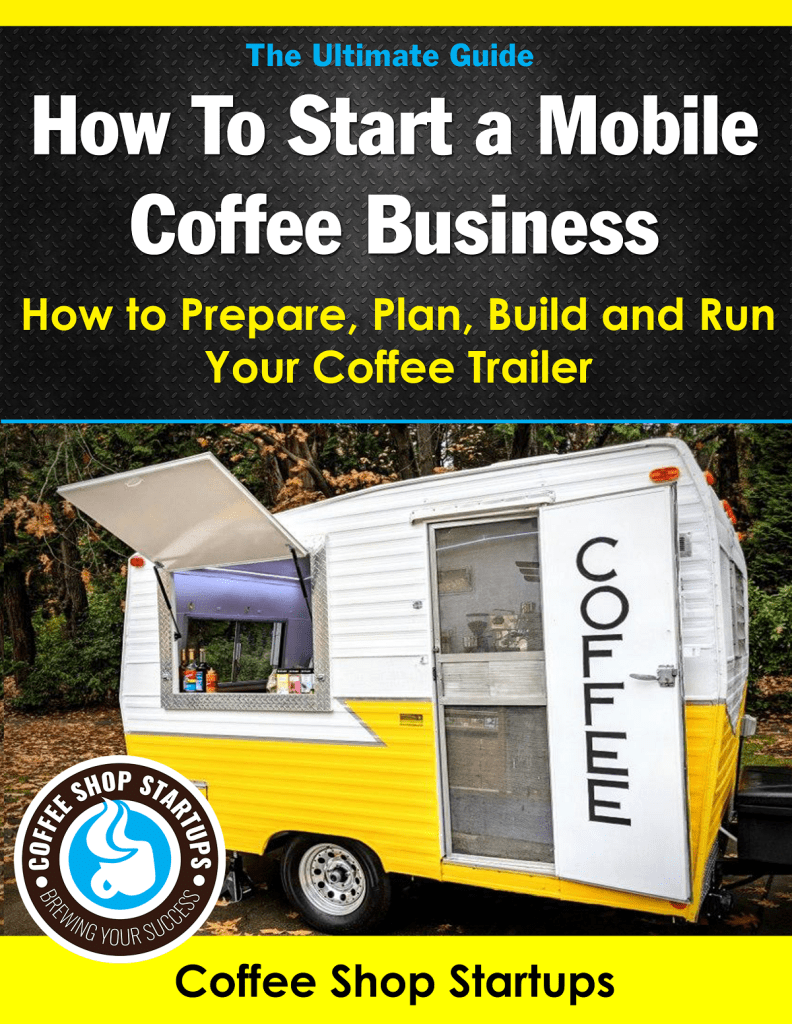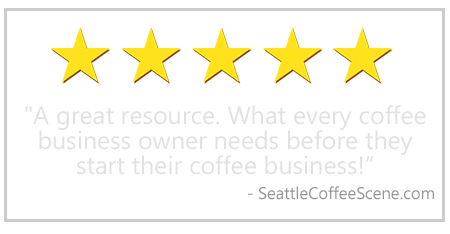Things You Need to Know Before Refurbishing a Coffee Truck
Coffee Truck Buildout
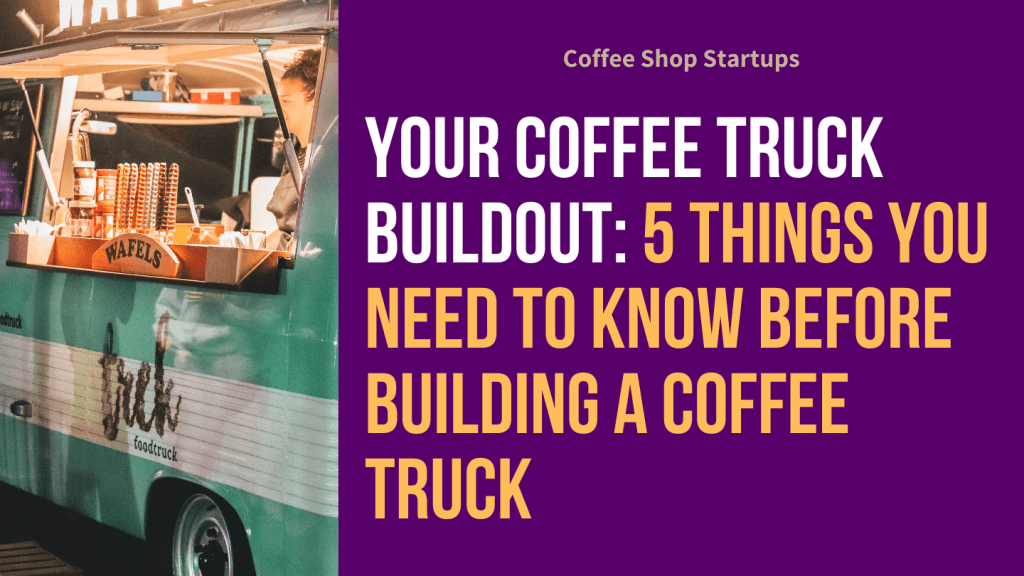
Your Coffee Truck Buildout:
5 Things You Need to Know Before Building and Refurbishing a Coffee Truck
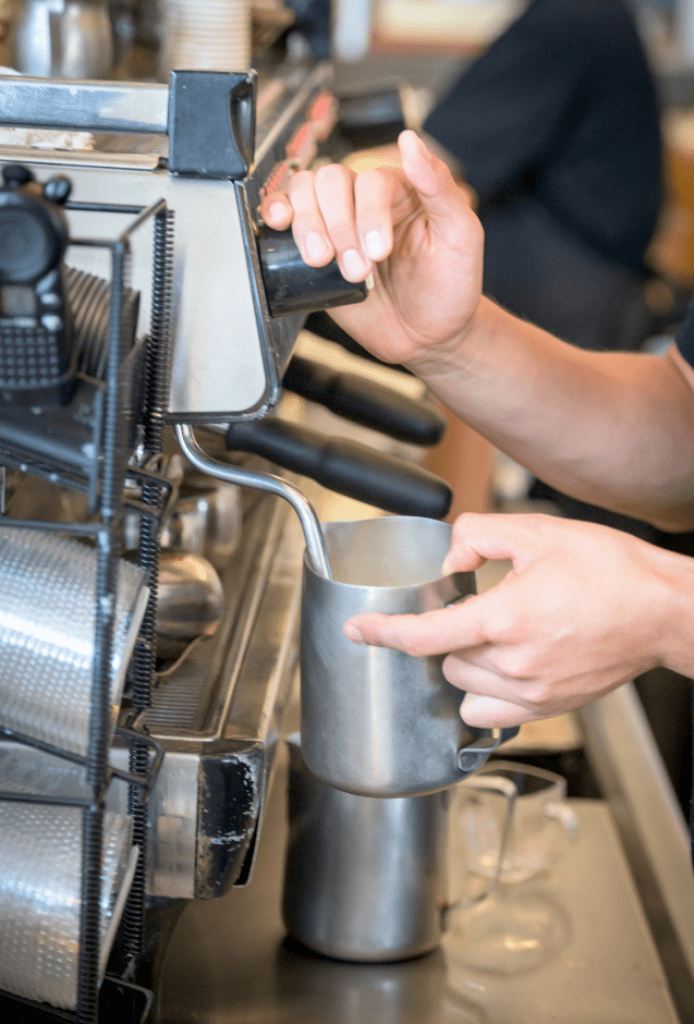 It’s an exciting prospect to start a coffee truck business by building it yourself. But before you reconstruct your coffee truck or trailer, you’ll want to consider a few main points centered on your preparation.
It’s an exciting prospect to start a coffee truck business by building it yourself. But before you reconstruct your coffee truck or trailer, you’ll want to consider a few main points centered on your preparation.
Abraham Lincoln was once quoted as saying:
“Give me six hours to chop down a tree, and I will spend the first four sharpening the axe.”
This also applies when starting your mobile coffee business. The more you prepare—even with your coffee truck buildout—the more time, money, and possibly heartache you'll save on building your mobile unit.
So, let’s get started with the things you need to know before starting your coffee truck buildout:
1. Understand Your Local Regulations
Before you begin building and refurbishing your coffee truck, thoroughly research the local health and safety regulations.
I can't stress this enough. Regulations to build a coffee truck vary widely depending on your specific location, so it's important to understand the specific requirements in your area. Also, agencies are continuously updating their regulations, so keep tabs on any new changes.
Key aspects to investigate include plumbing standards, electrical installation, and any size requirements. Additionally, you may also focus on sanitation standards, food handling practices, and waste disposal procedures. Many local health departments provide detailed guidelines and resources, so start by visiting their websites or contacting these health agencies directly for the most accurate and up-to-date information.
Get The Ultimate Mobile Coffee E-book
Save Money and Valuable Time With Our Complete Guide
Requirements for Mobile Food Units
Operating a mobile food unit, such as a coffee truck, comes with its own set of requirements. These typically include obtaining various permits and licenses to legally operate.
Common requirements include:
- Health Permits: Issued by the local health department, this permit ensures your coffee truck meets health and safety standards.
- Business License: Required to operate any business within a municipality legally.
- Food Handler's Permit: To certify knowledge in safe food handling practices for you and your staff.
- Fire Department Inspection: Ensures your truck meets fire safety standards, especially concerning cooking and heating equipment.
- Zoning Permits: To legally operate in specific locations, you may need approval from the local zoning board.
Each of these permits and licenses involves an application process that may include inspections and fees. Make sure to allow ample time to complete these steps before your intended launch date. Sometimes, it's easy to get lost in all the administrative stuff. Staying organized, creating a folder, and using color highlighters can all be helpful.
Importance of Coffee Truck Compliance
Compliance with local regulations is a legal obligation and a critical component of building and running a successful coffee shop – the same is true for a coffee truck business.
Coffee trucks that fail to comply with health and safety standards can cause additional fees, material costs, and longer wait times for reinspections and additional changes.
For additional reading, check out our post, Permits and Licenses Needed to Start a Coffee Shop.
Coffee Truck Buildout Success
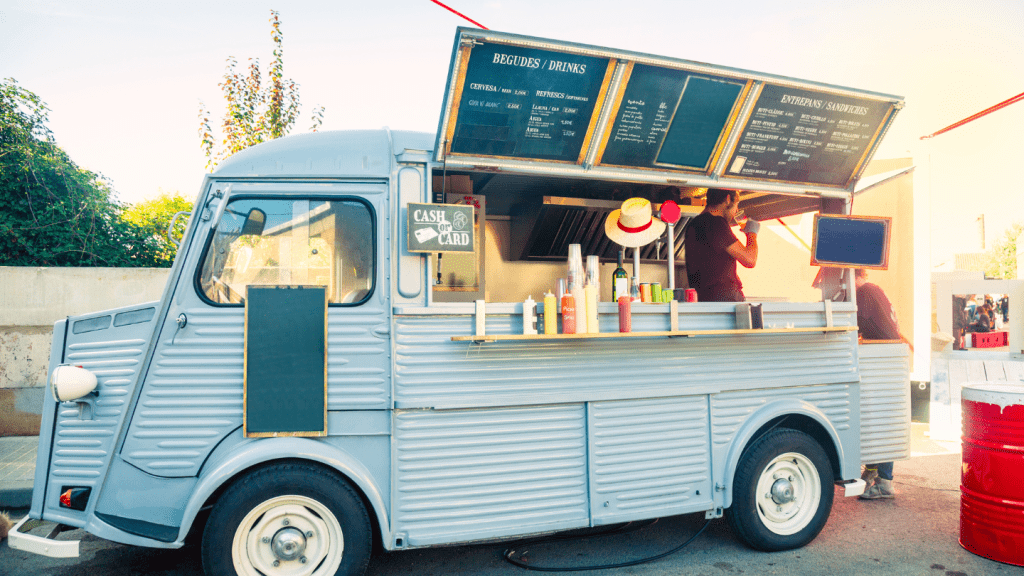
2. Choosing the Right Coffee Truck Base Vehicle
When it comes to selecting the base vehicle for your coffee truck, you have several options to choose from, each with its own set of advantages:
Vans: Common choices include cargo vans and step vans. Cargo vans are typically smaller, offering easier maneuverability and parking in urban areas. Step vans, like those used by delivery services, provide more space for equipment and storage, making them ideal for high-volume operations.
Trucks: Box trucks or delivery trucks offer ample space and can be customized extensively. These are suitable for larger operations where more equipment and storage are needed.
Trailers: A trailer can be a good option if you already have a suitable towing vehicle. They offer flexibility in that you can detach the coffee trailer and use the towing vehicle separately.
Trailers can also provide more interior space than some vans and trucks.
To get started with your coffee trailer, read our post, How to Start a Coffee Trailer Successfully.
Factors to Consider
When choosing the right vehicle, consider the following factors:
- Size: The size of the vehicle should match your business needs. Consider the amount of equipment you need to install, storage space for supplies, and space for staff to work comfortably. Ensure the vehicle fits within any size restrictions for your operating locations.
- Reliability: A reliable vehicle is essential to minimize downtime and repair costs. Look for vehicles with a good track record of durability and low maintenance issues.
- Fuel Efficiency: Since your coffee truck will be mobile, fuel efficiency is an important consideration. Gas can add significant daily costs to your operation. A more fuel-efficient vehicle can help reduce operating costs over time, especially if you plan to travel long distances or operate in multiple locations.
- Maintenance Costs: Consider the cost and availability of parts and services for the vehicle. Some fancy but older vehicles highlighted on social media may have higher maintenance costs or require specialized service that isn't readily available everywhere.
Your Coffee Truck Buildout
Pros and Cons of New Versus Used Mobile Coffee Base Vehicles
When deciding between a new or used vehicle for your mobile coffee business, weigh the following pros and cons:
New Vehicles:
Pros:
- New vehicles often come with a warranty, which can reduce some of the cost of repairs and maintenance during the warranty period.
- Less likely to have existing wear and tear, leading to potentially lower maintenance costs initially.
- Opportunity to customize the vehicle from scratch to meet your specific mobile coffee needs.
Cons:
- Higher upfront cost compared to used vehicles.
- Depreciation starts as soon as you drive it off the lot, which can be a financial consideration if you plan to sell it in the future.
Used Vehicles:
Pros:
- Lower initial cost, making it a more affordable option for mobile coffee startups.
- Potential to find a well-maintained used vehicle that has already been outfitted for a similar purpose, saving on customization costs.
Cons:
- A higher risk of existing issues or wear and tear could lead to increased maintenance and repair costs.
- Limited or no warranty, meaning you'll bear the full cost of any repairs needed.
- Refurbishing and customizing it may require more initial work to meet your needs.
The right base vehicle for your coffee truck will depend on your specific coffee business, needs, budget, and long-term business goals. Carefully assess each option and consider seeking advice from industry professionals to make the best choice for your mobile coffee business.
Further Reading: Coffee Truck Ideas
Coffee Truck Buildout Planning
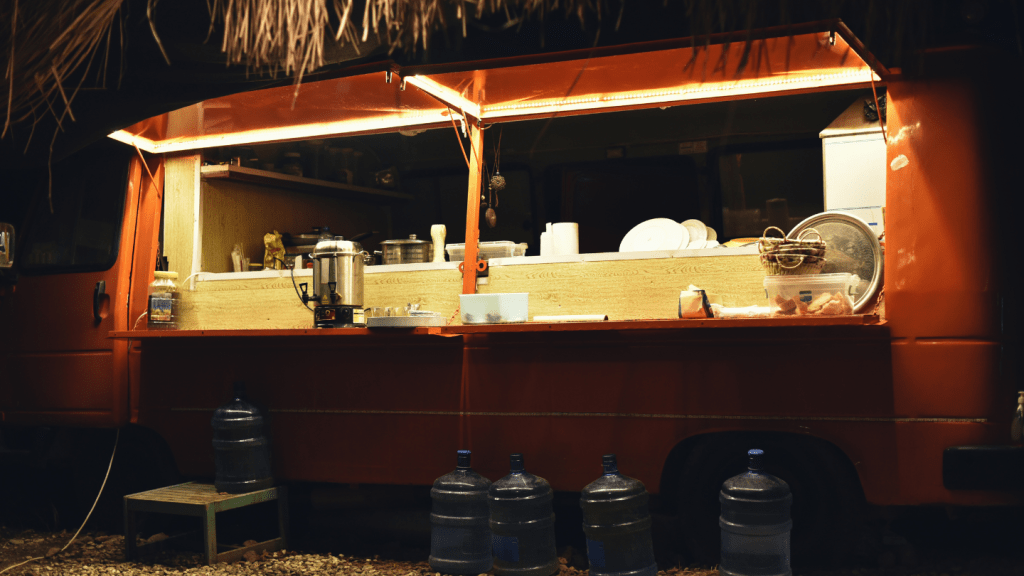
3. Budgeting for the Coffee Truck Buildout
Starting a coffee truck is one of the lower-cost options for starting a coffee business. Creating a comprehensive budget is crucial in building and refurbishing your coffee truck. To ensure you have a realistic financial plan, consider the following key components:
Vehicle Purchase: The cost of your base vehicle will be one of the largest upfront expenses. Depending on whether you choose a new or used vehicle, this can range from a few thousand to tens of thousands of dollars.
Equipment: Essential coffee equipment includes espresso machines, grinders, refrigerators, sinks, water tanks, and POS systems. High-quality equipment is vital for reliable service, so allocate a significant portion of your mobile coffee budget here. Coffee equipment costs can vary widely, typically ranging from $10,000 to $50,000.
Refurbishment: This includes all modifications and upgrades needed to transform the base vehicle into a functional coffee truck. Costs include installing electrical and plumbing systems, insulation, ventilation, custom cabinetry, and interior finishes. Refurbishment can cost anywhere from $5,000 to $30,000 or more, depending on the complexity of your design and the materials used.
Licenses and Permits: Budget for obtaining the necessary permits and licenses to operate a coffee business legally. This can include health permits, business licenses, and parking permits. Costs will vary by location but typically range for a mobile coffee business from a few hundred to a few thousand dollars.
Marketing and Branding: Consider the costs of branding your coffee truck, including exterior wraps, signage, and marketing materials. These mobile coffee business costs can range from $1,000 to $5,000.
Contingencies: Unexpected expenses are almost inevitable, so it's wise to set aside a contingency fund. Allocate at least 10-15% of your total budget for unforeseen costs.
Importance of Setting a Realistic Mobile Coffee Buildout Budget
Setting a realistic budget for your mobile coffee buildout is crucial to avoid financial strain. Overestimating your budget can lead to underfunding important aspects of your build, while underestimating can result in running out of funds before the project is completed.
A detailed budget helps ensure you have the necessary resources to cover all expenses and reduces the risk of encountering financial difficulties. A well-planned budget can also guide your decisions, helping you prioritize spending and make informed trade-offs where necessary.
Potential Sources of Financing
There are several ways to finance and fund your coffee truck buildout, each with its own advantages and considerations:
- Savings: Using personal savings can be a straightforward way to fund your build without incurring debt. However, this approach requires having sufficient funds available and can deplete your personal financial reserves.
- Loans: Many mobile coffee shop business owners have utlized loans from banks or credit unions can provide the capital needed for your project. Be prepared to present a solid business plan and demonstrate your ability to repay the loan. Consider the interest rates and terms carefully to ensure they align with your business's financial projections.
- Investors: Bringing on investors can provide significant funding without immediate repayment obligations. In exchange for their investment, you typically offer a share of ownership or future profits. This approach can be beneficial if you need substantial capital and are willing to share control of your business.
- Crowdfunding: Platforms like Kickstarter or GoFundMe allow you to raise funds from the public. This method can also help generate early interest and build a customer base. However, successful crowdfunding campaigns require effective marketing and a compelling story.
By carefully estimating costs, setting a realistic budget, and exploring various financing options, you can effectively plan and manage the financial aspects of building and refurbishing your coffee truck, ensuring a smooth path to launching your mobile coffee business.
Coffee Truck Buildout Planning
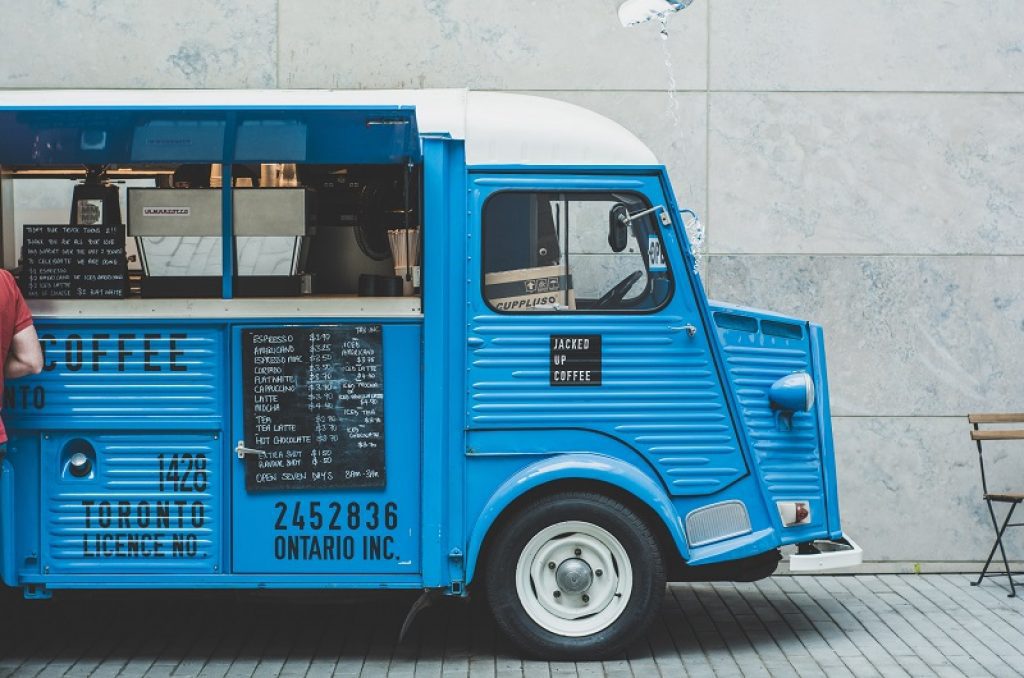
4. Your Coffee Trailer Towing or Pull Vehicle
If you decide to use a trailer for your coffee business, selecting the right towing vehicle is crucial. Your choice should be based on the trailer's size, weight, and the terrain you'll be navigating.
Here are some key considerations:
Towing Capacity: Ensure the pull vehicle you choose has a towing capacity that well exceeds the total weight of your fully loaded trailer. This includes the weight of the trailer itself, all equipment, supplies, and any other items you plan to carry. It's better to have a vehicle with a higher towing capacity to avoid straining the engine and transmission.
Type of Vehicle: Pickup trucks, SUVs, and certain vans are typically the best options for towing. Look for models specifically designed for heavy-duty towing, which often come with reinforced frames, stronger brakes, and upgraded suspension systems. Popular choices include models from Ford, Chevrolet, GMC, and Ram, which offer robust towing capabilities.
Ensuring the Towing Vehicle Has the Appropriate Towing Capacity and Hitch Setup
To safely tow your coffee trailer, the towing vehicle must be properly equipped:
- Hitch Type: There are several types of hitches, including weight-carrying hitches and weight-distributing hitches. Weight-distributing hitches are generally recommended for heavier loads as they distribute the trailer's weight more evenly across the towing or pull vehicle and trailer axles, improving stability and control.
- Brake Controller: For heavier trailers, a brake controller is essential. It synchronizes the trailer brakes with the towing vehicle's brakes, providing smoother stops and reducing wear on both braking systems.
- Hitch Receiver and Ball Mount: Ensure the hitch receiver is rated for the weight you intend to tow. The ball mount and hitch ball must also match the weight and coupling requirements of your trailer.
Importance of Regular Maintenance for the Towing Vehicle to Ensure Safety and Reliability
Maintaining your towing vehicle is essential to ensure safe and reliable operations. Regular maintenance should include:
By choosing the right towing vehicle, ensuring it is properly equipped, and maintaining it diligently, you can safely and efficiently tow your coffee trailer, providing a stable, sturdy, and reliable foundation for your mobile coffee business.
5. Having the Physical Space to Work
Securing a Suitable Workspace for Building and Refurbishing the Truck
One of the first steps in the process of building and refurbishing your coffee truck is to secure a suitable workspace. The physical space you choose will significantly impact the efficiency and quality of your work. Ideally, this workspace should be sheltered, such as a garage, workshop, or a large shed, to protect your vehicle and materials from the elements.
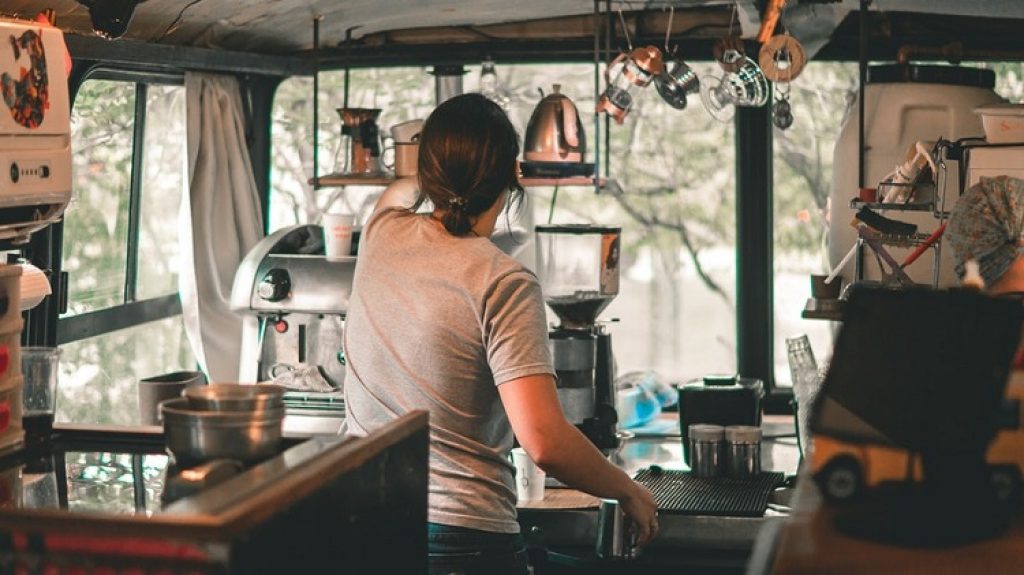
Importance of Having Space for Vehicle Access, Tools, and Materials
Having ample physical workspace is crucial for several reasons:
- Vehicle Access: Your workspace should allow easy access to all sides of the vehicle. This means having enough room to move around the truck with ease, enabling you to work on different parts without having to constantly move the vehicle. A spacious environment also facilitates safe movement and reduces the risk of accidents.
- Tools and Equipment: Building and refurbishing a coffee truck requires a variety of tools and equipment. Ample space ensures you can store and organize these tools efficiently, keeping them readily accessible when needed. A clutter-free workspace enhances productivity and safety.
- Materials Storage: You will need to store various materials, such as plywood, insulation, plumbing supplies, electrical components, and fixtures. Sufficient space allows you to organize these materials properly, ensuring they are protected from damage and easy to locate when needed.
- Work Area: Besides the vehicle, you need dedicated areas for tasks like cutting materials, assembling components, and testing equipment. A well-organized workspace with designated areas for different tasks can significantly streamline your workflow.
Considering Renting a Garage or Workshop if Needed
If you don't have access to a suitable workspace at home, consider renting a garage or workshop. Here are some benefits and considerations:
- Professional Environment: Renting a dedicated workspace can provide a more professional environment, with access to facilities designed for vehicle work. This might include better lighting, ventilation, and specialized equipment.
- Enhanced Productivity: A rented workspace often comes with fewer distractions than a home environment, allowing you to focus more effectively on your project.
- Safety and Security: A professional workshop is likely to offer better security for your vehicle and coffee truck buildout materials, reducing the risk of theft or damage.
Securing a suitable and spacious workspace is a foundational step in the successful build and refurbishment of your coffee truck. Whether at home or through a rented facility, ensure your workspace is well-organized, safe, and equipped to handle the various demands of your project. This investment in the right environment will pay off in the efficiency, quality, and safety of your build process.
Coffee Shop Startups
Mobile Coffee Business Coaching
Starting a coffee truck is a great option for many would-be coffee entrepreneurs. Yet, starting a coffee truck requires you to consider several important factors before spending significant money.
We offer an affordable mobile coffee consulting service that can help you get your coffee truck off the ground. To schedule a consultation, email us at contact@coffeeshopstartups.com.
The best way to start your mobile coffee business is to invest in learning all you can about retail coffee and learn from real-world coffee managers, business owners, and experts.
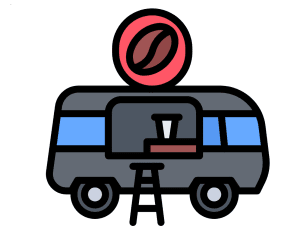
Get The Ultimate Guide!
How to Start Your Mobile Coffee Business
Our guide walks you through every step of launching your own mobile coffee business, providing the expert insights you need to succeed.
✅ Practical Tips and Insider Knowledge: Get hands-on advice on everything from choosing your mobile unit to crafting a unique coffee experience.
✅ Build a Profitable Business: Discover how to find the best locations and market your mobile coffee business to attract a loyal customer base.
✅Start with Confidence and Save Money: With our comprehensive guide, you'll have all the tools and knowledge to kickstart your journey into mobile coffee entrepreneurship – more affordably and quickly.
The Ultimate Mobile Coffee Business E-book
Successfully Plan and Launch Your Mobile Coffee Business
* The information on this page is for educational purposes only. We do not offer legal or investment advice.

